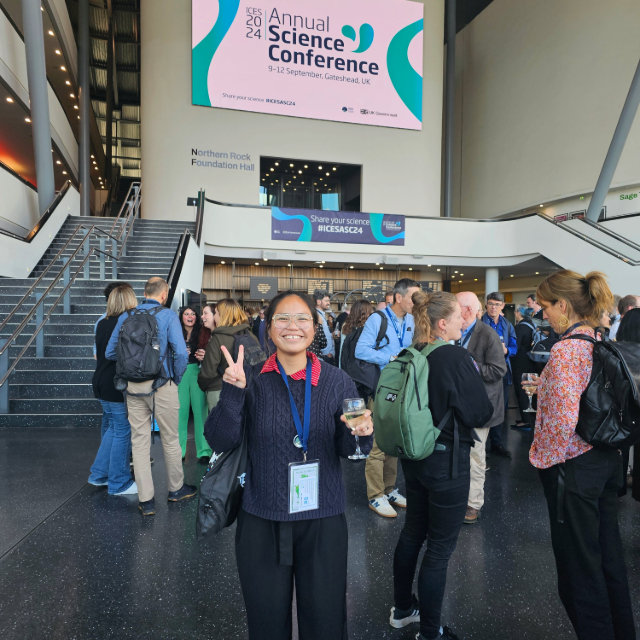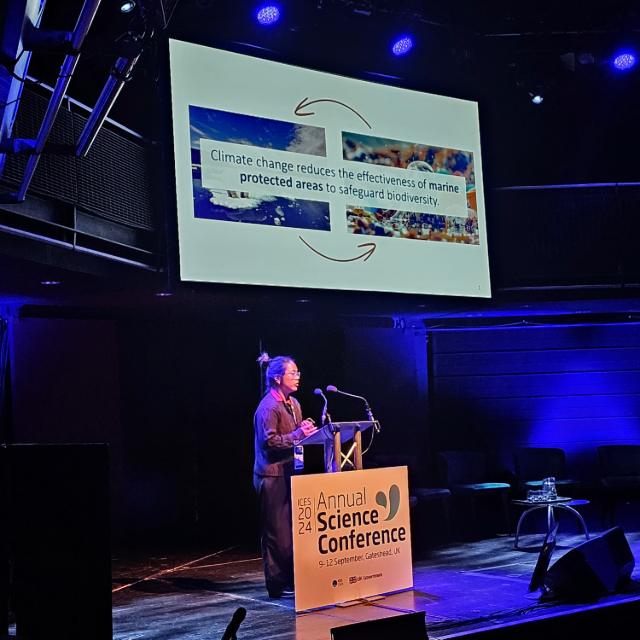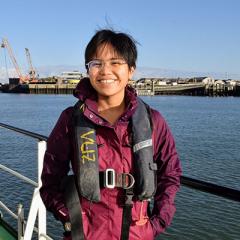CBCS PhD candidate
After 30 hours of uncomfortable air travel and inconvenient flight delays, I arrived in Gateshead, UK, to attend my first international conference: the 115th Annual Science Conference of the International Council for the Exploration of the Seas (ICES).
There, I presented a sneak peek of one of the first chapters of my PhD, “Current approaches and future opportunities in designing climate-smart protected areas”. As a budding quantitative marine conservation scientist focused on developing different tools to facilitate the uptake of climate-smart approaches in on-the-ground conservation planning, attending the Annual Science Conference of the ICES – a large marine science conference with a fisheries focus – was an eye-opening experience.
Assembling hundreds of marine scientists
ICES is a 122-year-old intergovernmental marine science organisation of nearly 6000 scientists from over 20 member countries. The ICES network builds and collates databases of knowledge from its scientific experts, develops tools to better visualise and analyse data and provides scientific advice to partners. ICES also hosts many events including trainings, workshops and expert-group meetings.
The biggest event is the Annual Science Conference, where hundreds of attendees gather to present the latest findings in their respective fields of marine science and build networks and connections that cross disciplines, continents and career stages. It provides the right environment to stimulate the birth of new ideas and collaborations that will advance various fields of marine science. This year, it was held in the Glasshouse International Centre for Music.
The 115th Annual Science Conference focused on transdisciplinary approaches to marine science and ecosystem-based fisheries management, with keynote speakers and theme sessions revolving around these topics. There was a push to incorporate human dimensions in decision-making involved in fisheries management and spatial planning. It was great to see the continuous uptake and integration of the perspectives of multiple stakeholders – from different disciplines – in more applied marine sciences.
A desire to advance the development of offshore renewables was also apparent, with multiple theme sessions focused on presenting the benefits of wind farms and floating solar farms. Multiple side events and workshops were geared towards engaging early career scientists. Some of these I attended, notably the workshop on graphic design for scientific visual communication at the Dove Marine Lab in Newcastle, and the side event led by the Editor-in-Chief of ICES Journal of Marine Science, Howard Browman. ICES actively encourages early career scientists, including PhD students, to participate in working groups and trainings.

Image credit: Silvina Ivaylova
Moving climate-smart conservation planning forward
While hearing many noteworthy talks across a variety of topics was great, the highlight of the conference was participating in my theme session, “Accounting for climate change in marine spatial planning: experiences and lessons learnt”, led by the conveners, Catarina Marques Da Fonseca of the Intergovernmental Oceanographic Commission (IOC) of the UN Education, Scientific, and Cultural Organization (UNESCO), Kira Gee of Helmholtz- Zentrum Hereon and Talya ten Brink of the National Oceanic and Atmospheric Association (NOAA). Like the other sessions, the presenters were a mix of scientists, managers and practitioners, providing different perspectives on the same topic.
In this theme session, I presented the main findings of a review paper I led where we summarised the different approaches to designing area-based management tools, which include protected areas, provided actionable guidance for applying these climate-smart approaches and highlighted the future direction of climate-smart conservation planning. Despite being disheartened by the lack of conservation focus throughout the conference, I was pleasantly surprised that my insights as a marine conservation scientist during the panel discussion were welcomed with open arms. In the panel discussion, I, along with many others, talked about how spatial planning and conservation planning do not have to be considered separately and are, in fact, synergistic. In the eyes of marine spatial planners who are mostly based in Europe, conservation is viewed as another conflicting stakeholder – but I pointed out that it doesn’t have to be the case. In fact, multiple lab groups at CBCS are developing ways to incorporate the needs of different stakeholders in our spatial/ conservation plans.

Image credit: Image credit: Silvina Ivaylova
Key takeaways
As a PhD candidate, it was truly an amazing experience to interact and converse with scientists, practitioners and managers in the field of climate-smart marine spatial planning. By actively participating in an event held on the other side of the globe – far from the four corners of my office and the safe confines of being behind my laptop all day – I learned so much, particularly:
- There are a lot of unexplored synergies between broader marine spatial planning and conservation planning. Exploring the intersection of these disciplines has great untapped potential.
- Measures of climate change should be incorporated in different steps of both marine spatial-planning and conservation-planning processes. We should move towards more adaptive measures in spatial and conservation planning.
- Collaboration is the name of the game! Conversations are key. There are multiple stakeholders in the process of conservation planning and spatial planning. Stakeholder engagement throughout the processes is paramount (and shouldn’t just be done when the spatial plans are finished just to tick a box!).
Attending this international conference as a CBCS PhD candidate was a life- changing experience and I just can’t wait to see what’s next for me!
To keep up to date on our latest events, check out our Bluesky and LinkedIn.

